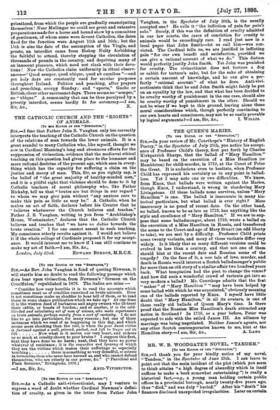THE QUEEN'S MARIES.
[To THE EDITOR or THE "SPECTATOR."] SIE,—In your review of Mr. Courthope's "History of English Poetry," in the Spectator of July 20th, you notice his accept- ance of Professor Child's theory, first put forth by Charles Kirkpatrick Sharpe, that the ballad of "Mary Hamilton" may be based on the execution of a Miss Hamilton (or Hambleton) for child-murder, in 1719, at the Court of Peter the Great. It is audacious even to hesitate, when Professor Child has expressed his certainty as to any point in ballad- lore. Yet I may note one or two difficulties. We know, from Knox, that ballads were written against the Marks, though Knox, I understand, is wrong in slandering Mary Livingstone. Of these ballads none survives, unless "Mary Hamilton" is one. The ballad is inaccurate in many his- torical particulars, but what ballad is ever right ? Mere inaccuracy is no proof of recent date. On the other hand, no ballad, known to be as late as 1719, has anything like the style and excellence of " Mary Hamilton." If we are to sup- pose that some balladmonger, about 1719, wrote a ballad on the execution of a Miss Hamilton in Russia, and transferred the scene to the Court and age of Mary Stuart (an odd liberty to take), we are met by a difficulty. Professor Child prints some twenty variants, and many of these variants differ very widely. Is it likely that so many different versions could be evolved in less than a century, and that not one of them should hint at the recent date and Russian scene of the tragedy ? On the face of it, a new tale of love, murder, and death in Russia would interest a Scotch balladmonger's public far more than an old story of a similar affair two hundred years back. What temptation had the poet to change the venue P And how did such a wonderful crowd of variants get into so very modern a ballad ? Mr. Courthope admits that the first " maker " of " Mary Hamilton " " may have been helped by some ballad with which he was acquainted," obviously meaning one of the ballads reported by Knox. I myself have little doubt that " Mary Hamilton," in all its avatars, is one of those really old ballads of Queen Mary's time. Is there proof that the Russian Miss Hamilton's death attracted any notice in Scotland ? In 1719, or a year before, Peter was expected to side with the exiled James III. An alliance by marriage was being negotiated. Neither James's agents, nor any other Scotch contemporaries known to me, hint at the
Hamilton story.—I am, Sir, &c., A. LANG


































 Previous page
Previous page